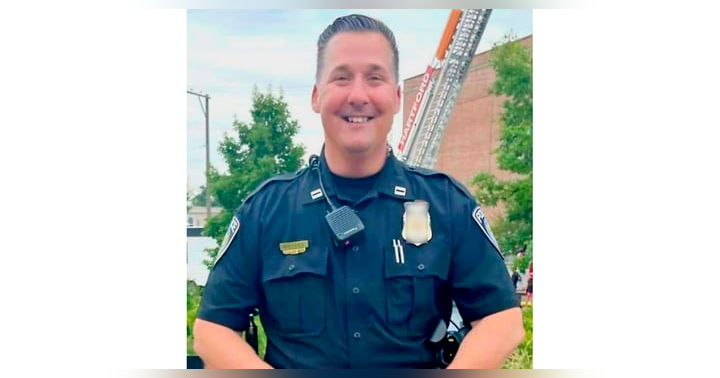From Firefighter to Police Officer: His Journey Through Trauma

From Firefighter to Police Officer: His Journey Through Trauma. The powerful story of Dennis Pishock, a dedicated first responder who served his community as both a firefighter and a police officer. Dennis faced countless traumatic events throughout his career, and these experiences took a significant toll on his mental health. This blog post expands on the themes explored in our latest podcast episode, Police and Firefighters, Trauma and Recovery, where Dennis shares his journey through trauma and recovery. We'll examine the unique challenges faced by firefighters and police officers, the impact of trauma on their personal lives, and the importance of seeking help and finding support. Dennis's story is a testament to the resilience of first responders and offers hope for those struggling with PTSD and other mental health challenges. Join us as we explore his inspiring path from trauma to healing.
From Firefighter to Police Officer: A Career of Service
Dennis Pishock's career is a testament to his unwavering commitment to serving his community. He began his journey as a firefighter, a role that placed him on the front lines of emergencies, from rescuing people from burning buildings to responding to medical crises. After years of dedicated service in the fire department, Dennis felt a calling to continue serving in a different capacity, leading him to transition to law enforcement. This career change was not just a job shift; it was a continuation of his desire to protect and serve, albeit in a new and demanding environment. As a police officer, he faced a different set of challenges, including dealing with violent crime, investigating complex cases, and maintaining order in the face of chaos. Dennis's dedication to public service is evident in every step of his career, highlighting his commitment to making a difference in the lives of those around him. However, this unwavering dedication came at a cost, as the cumulative effects of trauma began to take their toll.
The Traumas Faced as a Firefighter
Firefighting is an inherently dangerous profession, exposing individuals to a wide range of traumatic events. Firefighters routinely witness horrific scenes, including severe burns, injuries, and fatalities. They often face life-threatening situations, such as collapsing buildings, explosions, and hazardous materials. The emotional toll of these experiences can be immense, leading to feelings of anxiety, fear, and helplessness.
READ THIS FREE ARTICLE: Could This Be The One Trait that Predators Target?
One particularly impactful event in Dennis's career as a firefighter involved a swift water rescue where an eight-year-old girl drowned. Even though the team found her quickly, they could not extract her from the river due to the strong current. The inability to save her, along with the knowledge that her parents were standing nearby, haunted him for years. Firefighters must also cope with the stress of making split-second decisions under immense pressure, knowing that their actions can have life-or-death consequences. The constant exposure to trauma can lead to the development of post-traumatic stress disorder (PTSD) and other mental health challenges, making it essential for firefighters to have access to resources and support to cope with the emotional demands of their job. Dennis would find out that even after he thought that he had processed those events, they were still there to affect him later on.
Transitioning to Law Enforcement and Facing New Challenges
The transition from firefighting to law enforcement brought a new set of challenges and traumas for Dennis. As a police officer, he was confronted with a different kind of danger and distress. Law enforcement officers often deal with violent crime, including shootings, assaults, and domestic disputes. They are frequently exposed to the aftermath of tragic events, such as fatal car accidents and suicides. Additionally, police officers face the stress of interacting with individuals in crisis, managing tense situations, and making difficult decisions under pressure. The constant exposure to these stressors can lead to emotional exhaustion, burnout, and mental health issues. Dennis found that while firefighting involved responding to emergencies and providing immediate assistance, law enforcement often required him to investigate complex cases, confront dangerous individuals, and enforce the law in challenging situations. This shift in focus added another layer of complexity to his experiences, compounding the effects of previous traumas and creating new challenges for his mental and emotional well-being. Dennis soon came to learn that the brotherhood between the two professions was stronger than any differences, but the specific experiences were different. From Firefighter to Police Officer: His Journey Through Trauma.
The Impact of Trauma on Personal Life
The traumas experienced as a firefighter and police officer had a profound impact on Dennis's personal life. The emotional toll of witnessing human suffering, facing life-threatening situations, and dealing with constant stress began to affect his relationships, his mood, and his overall well-being. He found himself becoming more withdrawn, irritable, and emotionally numb.
LISTEN TO THE FREE PODCAST: Could This Be the Miracle Breakthrough for PTSD?
The weight of his experiences made it difficult to connect with loved ones and to find joy in everyday activities. Dennis's family life began to suffer as he struggled to balance the demands of his job with his responsibilities at home. He found it hard to talk about what he had seen and experienced, leading to a sense of isolation and detachment. The cumulative effects of trauma began to erode his sense of self, leaving him feeling lost, overwhelmed, and disconnected from the person he once was. Recognizing the impact of trauma on his personal life was a crucial step in Dennis's journey toward healing and recovery. The biggest realization he had was that those around him had noticed a change in him, and he was the last to realize that he had been affected by the traumas he faced.
The Turning Point: Recognizing the Need for Help
The turning point in Dennis's story came when he realized that he could no longer ignore the impact of trauma on his life. The recognition that he needed help was a moment of profound honesty and courage. He had spent years pushing down his emotions, trying to cope on his own, and believing that seeking help was a sign of weakness. However, as the weight of his experiences continued to mount, he realized that he was struggling to function effectively in his personal and professional life. Attending a peer support training was instrumental in helping Dennis recognize the extent of his struggles. Hearing the stories of other first responders who had faced similar challenges made him realize that he was not alone and that seeking help was not a sign of weakness, but a sign of strength. The suicides of several close friends, all fellow first responders, served as a stark reminder of the importance of addressing mental health issues. This wake-up call motivated Dennis to take the first steps toward recovery, acknowledging that he could not continue to carry the burden of trauma on his own. Dennis had no idea how his turning point would later turn into a life of speaking to others in similar situations and helping them recognize their own need for help.
Understanding PTSD in First Responders
Post-traumatic stress disorder (PTSD) is a mental health condition that can develop after experiencing or witnessing a traumatic event. First responders, such as firefighters and police officers, are at a higher risk of developing PTSD due to their frequent exposure to traumatic incidents. PTSD can manifest in a variety of symptoms, including intrusive memories, nightmares, flashbacks, avoidance of reminders of the trauma, negative thoughts and feelings, and hyperarousal. These symptoms can significantly interfere with a person's ability to function in their daily life, impacting their relationships, work, and overall well-being.
READ THIS FREE ARTICLE: Why Do Some People Call Police "12" and "Pigs"?
Research indicates that between 10% and 35% of police officers and firefighters develop PTSD, a rate significantly higher than the general population. Understanding the prevalence and impact of PTSD in first responders is crucial for providing appropriate support and resources to those who are struggling. Dennis's story highlights the importance of recognizing the signs and symptoms of PTSD and seeking professional help to address the underlying trauma. It is important to also recognize the fact that it is a common condition, and it should not be taken lightly. The dangers are more extensive than some might realize.
How PTSD Alters the Brain
PTSD can cause significant changes in brain structure and function, affecting how individuals process emotions, memories, and stress responses. Studies have shown that PTSD can lead to a reduction in the size of the hippocampus, a brain region involved in memory and learning. This can result in difficulties with memory consolidation and retrieval, contributing to the intrusive memories and flashbacks that are characteristic of PTSD. Additionally, PTSD can cause hyperactivity in the amygdala, the brain's emotional center, leading to heightened fear responses and emotional reactivity. At the same time, PTSD can weaken the prefrontal cortex, the brain region responsible for regulating emotions and controlling impulses. This can result in difficulties in managing emotions, controlling behavior, and making rational decisions. These alterations in brain function can contribute to the wide range of symptoms associated with PTSD, including anxiety, depression, irritability, and difficulty concentrating. Understanding how PTSD affects the brain can help inform effective treatment approaches that target these specific changes. The treatments often focus on helping individuals regain control over their emotions and behaviors. From Firefighter to Police Officer: His Journey Through Trauma.
The Road to Recovery: A Journey, Not a Destination
Recovery from PTSD is not a quick fix or a one-time event; it is an ongoing journey that requires commitment, patience, and self-compassion. There is no single path to recovery, and what works for one person may not work for another. Some people find relief through therapy, such as cognitive behavioral therapy (CBT) or eye movement desensitization and reprocessing (EMDR), which can help them process traumatic memories and develop coping skills. Others benefit from medication, such as antidepressants or anti-anxiety drugs, which can help manage symptoms and improve overall functioning. In addition to professional treatment, self-care strategies, such as exercise, mindfulness, and social support, can play a vital role in the recovery process. Dennis emphasizes that recovery is not about erasing the past or forgetting traumatic events; it is about learning to live with the memories in a way that does not control your life. It is about developing resilience, finding meaning, and creating a life that is worth living, despite the challenges of PTSD. Dennis’s story showcases his journey, and shows the fact that a person may be changed by trauma, but those changes do not have to be the sum of the person’s life.
The Power of Peer Support
Peer support can be a powerful tool in the recovery process for first responders struggling with PTSD. Connecting with others who have experienced similar traumas can provide a sense of validation, understanding, and hope. Peer support groups offer a safe and confidential space for individuals to share their experiences, express their emotions, and receive support from others who can relate.
LISTEN TO THIS FREE PODCAST: Police and Firefighters, Trauma and Recovery
Talking to someone who has been there, who truly understands the unique challenges of being a first responder, can make a significant difference in overcoming feelings of isolation and shame. Peer support can also help reduce the stigma associated with mental health issues, encouraging more people to seek help and access treatment. Dennis highlights the importance of peer support in his own recovery journey, emphasizing that it was through connecting with other first responders that he realized he was not alone and that recovery was possible. Dennis was able to develop a passion for peer support groups, and he became an avid promoter of them. He knew that these groups could save lives.
Demons & Angels: Sharing the Journey Through a Book
Dennis Pishock's book, "Demons & Angels," is a powerful testament to his journey through trauma and recovery. In this book, Dennis shares his personal experiences as a firefighter and police officer, recounting the traumatic events that shaped his life and the strategies he used to cope. He also delves into the challenges of PTSD, offering insights into the impact of trauma on the brain and the importance of seeking help. "Demons & Angels" is not just a memoir; it is also a guide for other first responders who are struggling with PTSD. Dennis shares the lessons he has learned along the way, providing practical tips for managing symptoms, building resilience, and finding hope. The book aims to break the stigma associated with mental health issues in the first responder community, encouraging more people to seek help and access treatment. By sharing his story, Dennis hopes to inspire others to believe that recovery is possible, even in the face of overwhelming challenges. He is also hoping that by speaking and writing about his story, it will help him to continue healing as well. The book has become more than just his story, but a way to connect to others on similar journeys.
Conclusion: Hope and Recovery for First Responders
Dennis Pishock's story is a powerful reminder of the challenges faced by first responders and the importance of addressing mental health issues in this community. His journey from trauma to recovery offers hope and inspiration to those who are struggling with PTSD and other mental health challenges. By sharing his experiences, Dennis is breaking the stigma surrounding mental health and encouraging others to seek help. His book, "Demons & Angels," provides valuable insights and practical strategies for managing PTSD and building resilience. As we discussed in our podcast episode, Police and Firefighters, Trauma and Recovery, it is crucial to provide first responders with the resources and support they need to cope with the emotional demands of their job. Peer support, professional treatment, and self-care strategies can all play a vital role in the recovery process. Dennis's story reminds us that recovery is possible, and that even in the darkest of times, there is always hope. We encourage you to listen to the full podcast episode to hear Dennis's story in his own words and to learn more about the challenges and triumphs of first responders. Thank you for joining us on this important conversation. From Firefighter to Police Officer: His Journey Through Trauma.






















